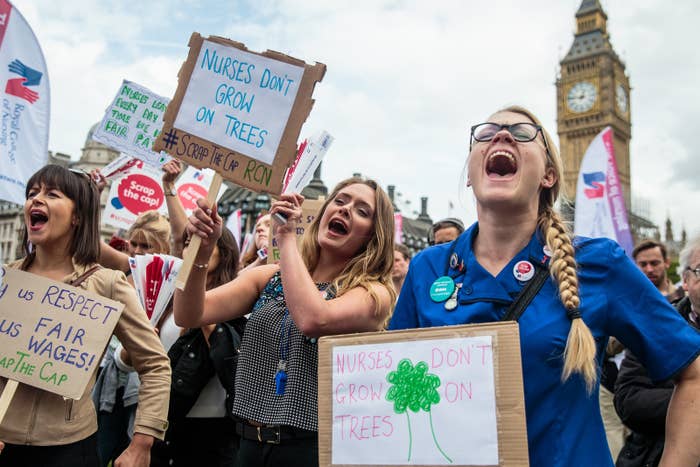
Police officers and prison staff will get pay rises this year – bringing an end to the government’s longstanding 1% public sector pay cap.
But critics have pointed out that it is effectively a pay cut, because the jump in their pay will be less than the rate of inflation, which hit 2.9% in August.
Police will get a 1% pay rise plus a 1% bonus for the year, while prison officers will get a 1.7% rise, the government announced on Tuesday.
A spokesperson for the prison officers union the POA called the offer a "smoke and mirrors" statement by the government that would continue to mean a real-terms pay-cut for prison officers.
"They say they’re breaking the cap but what they’re actually doing is giving prison officers a pay cut in real terms again," the spokesperson said.
Shortly after the announcement, reports circulated on social media that POA general secretary Steve Gillan had rejected the offer. POA's spokesperson said they were yet to receive details from the government's pay review body, instead learning of the offer from media reports, but that the increase would not be sufficient.
"What we’ve seen and what we’ve been told we would be rejecting," the spokesperson said. "It's not breaking the cap when inflation is at 2.9%. It’s an insult to hardworking people.
"It’s a significant loss in salary again, for the seventh consecutive year."
Labour leader Jeremy Corbyn applauded POA's decision to reject the offer, and accused the government of trying to "divide people on the cheap".
"The POA is right, a pay cut is a pay cut. We must be united in breaking the pay cap for all workers," Corbyn said during a speech at the Trades Union Congress annual conference later on Tuesday.
The Police Federation of England and Wales also appeared dissatisfied with the offer.
Steve White, the union's chair, said police deserved to be paid suitably for the “immensely demanding role they perform and this simply is not the case”.
He said: "The 2% award is a 1% pensionable pay rise across the board, plus 1% as an additional amount of money this year, non-pensionable. We asked for 2.8% and provided compelling evidence to support this."
A Police Federation source told BuzzFeed News that while they believed the increase would amount to less than £10 a week, they would have no choice but to accept the offer because of rules that prevent police forces from going on strike.
The prime minister's spokesperson said the government recognised the need for “flexibility” in pay for other public sector workers – including nurses and teachers – from next year, signalling an end to the 1% cap which was brought in in 2013. Before that, public sector pay had been frozen since 2010.
Frances O’Grady, general secretary for the Trades Union Congress, also dismissed the pay rises. "This below-inflation pay offer is pathetic,” she said.
"Public sector workers have suffered seven long years of real pay cuts, and are thousands of pounds worse off. Today’s announcement means bills will continue to rise faster than their wages. If ministers think a derisory rise like this will deal with the staffing crisis in our public services, they are sorely mistaken.”
A spokesperson for the Public and Commercial Services Union, called the government’s decision to lift the pay cap for police and prison officers, but not other workers, “totally unacceptable” and accused it of “divide and rule” tactics.
“What we need is a scrapping of the pay cap for all and no division between uniformed and non-uniformed workers, and an above inflation pay-rise to end the seven years of pay cut and pay restraint,” Battlemarch told BuzzFeed News.
The announcement comes amid rising anger from public sector workers over the pay cap and its impact on morale and retention of staff in key sectors. Earlier this morning the shadow justice secretary Richard Burgon repeatedly refused to rule out supporting illegal strike action.
Last week thousands of nurses gathered outside parliament to protest their pay. Many say they are struggling to pay basic living costs, and there are reports of some nurses having to use food banks.
PM Theresa May had been under pressure from many of her own MPs – not just opposition parties – to give public sector workers a break. She was widely expected to address the issue at Tory party conference at the end of this month.

